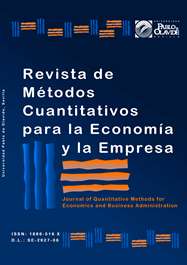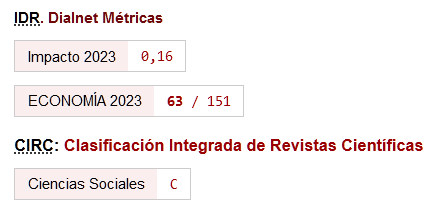Factors associated with the entrepreneurship of returned Colombian migrants: a Bayesian approach
DOI:
https://doi.org/10.46661/revmetodoscuanteconempresa.5105Keywords:
entrepreneurship, return migration, Bayesian inference, Global Entrepreneurship Monitor (GEM), Empirical Bayes MethodsAbstract
In this work, a set of characteristics associated with the fact that a returned Colombian migrant becomes an entrepreneur are identified. A set of data obtained from a modified form developed in 2012 (only for that year) of the Global Entrepreneurship Monitor (GEM) survey, were used in the analyses. The modified form included a set of questions about entrepreneurship to people who had returned to the country after living abroad an amount of time. A comparison was made between the probabilities of entrepreneurship in two regions of the country, Bogotá, the capital and the area with the greatest economic and financial development (n = 204), and the departments of the Colombian Caribbean Coast, an area with less industrial development and greater tourist strength (n = 203). The results were obtained using methods of the Bayesian paradigm of Statistics. Nine informative prior distributions constructed from the observed data (Empirical Bayes Methods) were considered and the Bayes factor was used as a criterion to select the model with the best fit to the data. According to the results, the factors that affect the probability that a returned migrant is an entrepreneur differ between regions and are related to the individual's self-confidence and their ability to prepare for inclusion in the country's productive sector.
Downloads
References
Alarcón, S., & Ordóñez, J. (2015) Ecuador: retorno migratorio y emprendimiento en Loja. Revista CEPAL, 117, 69-86. https://doi.org/10.18356/d18809ec-es
Batista, C., Mcindoe-Calderz, T., & Vicente, P. (2014). Return Migration, Self-Selection and Entrepreneurship in Mozambique. IZA Discussion Paper 8195. https://papers.ssrn.com/sol3/papers.cfm?abstract_id=2441491
Bedrick, E.J., Christensen, R., & Johnson, W. (1996). A new perspective on priors for generalized linear models. Journal of American Statistical Association, 91, 1450-1460. https://doi.org/10.2307/2291571
Bedrick, E.J., Christensen, R., & Johnson, W. (1997). Bayesian binomial regression: predicting survival at a trauma center. The American Statistician, 51, 211-218. https://doi.org/10.1080/00031305.1997.10473965
Bercovitz, J., Martens, A., & Savage, J. (2013). Human Mobility and Returnee Entrepreneurship: Evidence from Mexico. DRUID paper 35th, 17-19. https://conference.druid.dk/acc_papers/q0hhh6n51g6x8km92n345ysop9q9.pdf
Black, R., & Castaldo, A. (2009). Return migration and entrepreneurship in Ghana and Côte D’Ivoire: the role of capital transfers. Tijdschrift voor Economische en Sociale Geografie, 100(1), 44-58. https://doi.org/10.1111/j.1467-9663.2009.00504
Bula, H.O., Tiagha, E. (2012) Women Entrepreneurs in Kenya‘s Small Scale Enterprises: a demographic Perspective. European Journal of Business and Management, 4(9), 101-110. https://www.ku.ac.ke/schools/business/images/stories/research/women_entreprenures.pdf
Cárdenas, M., Medina, C., & Trejos, A. (2010). Measuring Economic and Social Impacts of Migration in Colombia: New evidence. Borradores de economía, 601, 1-54. https://doi.org/10.32468/be.601
Carlin, B.P., & Louis, T. (2000). Bayes and Empirical Bayes Methods for Data Analysis 2nd ed. Chapman & Hall/CRC. https://www.jstor.org/stable/3622080
Cassarino, J.P. (2004). Theorizing return migration: The conceptual approach to return migrants revisited. International Journal on Multicultural Societies, 6(2), 162-188. https://ssrn.com/abstract=1730637
Cavalcanti, L. (2004). La influencia de las nuevas tecnologías en el retorno de los inmigrantes contemporáneos. Scripta Nova, 8(170), Artículo 38. http://www.ub.edu/geocrit/sn/sn-170-38.htm
Cerase, F.P. (1974). Expectations and reality: A case study of return migrations from the United States to Southern Italy. International Migration Review, 8(2), 245-262. https://pubmed.ncbi.nlm.nih.gov/12339170
Congreso de Colombia (2012). Ley 1565 (Diario Oficial No. 48.508). www.senado.gov.co.
Cortizo, A., Frades, M., Hidalgo, C., & Sánchez, M. (2011). La migración de retorno en Castilla y León. Junta de Castilla y León y Fundación de cooperación y ciudadania de Castilla y León. https://www.researchgate.net/publication/347422953_La_migracion_de_retorno_en_Castilla_y_Leon
Crissien-Castillo, J.O. (2009). Investigando el entrepreneurship tras un marco teórico y su aporte al desarrollo económico de Colombia. Escuela de Administración de Negocios, 66, 67-83. https://doi.org/10.21158/01208160.n66.2009.473
Cruz V.M., Salas. A.R., & Pico, G.B. (2018). El emprendimiento de los migrantes retornados, el papel de las características de los migrantes y las particularidades de la experiencia migratoria. El caso del estado de México. Revista de Economía, 36(92), 46-93 http://www.scielo.org.mx/pdf/remy/v36n92/2395-8715-remy-36-92-46.pdf
Díaz, L.M. (2009). La quimera del retorno. Diálogos Migrantes, 4, 13-20.
Durand, J. (2004). Ensayo teórico sobre la migración de retorno. El principio del rendimiento decreciente. Cuadernos Geográficos, 35(2), 103-116. https://doi.org/10.30827/cuadgeo.v35i2.1784
Escandon, B.D., & Arias, S.A. (2011). Factores que componen la competitividad de las empresas creadas por mujeres y las relaciones entre ellos. Cuadernos de Administración, 24(42), 165-181. https://www.redalyc.org/pdf/205/20520042008.pdf
Gmelch, G. (1980). Return Migration. Annual Review of Anthropology. 9, 135-159. https://doi.org/10.1146/annurev.an.09.100180.001031
Gómez, L., Martínez, J., & Arzusa, B.M. (2006). Política pública y creación de empresas en Colombia. Pensamiento y Gestión, 21, 1-25. https://www.redalyc.org/pdf/646/64602101.pdf
Gómez, L., Martínez, C.P., Angulo, L.E., Orozco, T.J., Jiménez, P., et al. (2011). Global Entrepreneurship Monitor (GEM) Colombia Caribe 2010. Universidad del Norte, Universidad de Cartagena, Fundación Universitaria Tecnológico Comfenalco, Comfenalco Cartagena, Coosalud Cartagena, Corporación Universitaria del Caribe–CECAR, Universidad de Magdalena. Bogotá: Universidad del Norte, 2010.
González, L.H. (2013). Essays on Mexican Migration. Tesis Doctorado en Filosofía. University of Pittsburgh.
Gubert, F., & Nordman, C.J. (2008). Return migration and small enterprise development in the Maghreb. European University Institute, MIREM-AR, 2008/02. http://hdl.handle.net/1814/8887
Hamdouch, B., & Wahba, J. (2015) Return migration and entrepreneurship in Morocco. Middle East Development Journal, 7(2), 129-148, https://doi.org/10.1080/17938120.2015.1072696
Hercog, M., & Siegel, M. (2011). Promoting return and circular migration of the highly skilled. UNU‐MERIT Working Paper Series, 2011-015. https://www.researchgate.net/publication/228293997_Promoting_Return_and_Circular_Migration_of_the_Highly_Skilled
Kass R., & Raftery A. (1995). Bayes Factors. Journal of the American Statistical Association, 90 (430), 773-795. https://doi.org/10.2307/2291091
Kilic, T., Carletto, G., Davis, B., & Zezza, A. (2007). Investing Back Home: Return Migration and Business Ownership in Albania. The World Bank, Policy Research Working Paper 4366. http://www.fao.org/publications/card/en/c/a37ab1de-4490-5634-9fec-bfb4697cf386/
Mancilla, C., Viladomiu, L., & Guallarte, C. (2010). Emprendimiento, inmigrantes y municipios rurales: el caso de España. Economía Agraria y Recursos Naturales, 10(2), 123-144. https://dialnet.unirioja.es/servlet/articulo?codigo=3421952
Marchand, K., Fransen, S., & Siegel, M. (2013) Migrant Entrepreneurship, Remittances & Development. United Nations University-MERIT (UNU-MERIT) y Maastricht Graduate School of Governance (MGSoG). Background paper International Policy Debate 29 May 2013, 1-12.
Marchetta, F. (2012) Return Migration and the Survival of Entrepreneurial Activities in Egypt. European University Institute. working Papers RSCAS 2011/01 https://doi.org/10.1016/j.worlddev.2012.05.009
Martin, R., & Radu, D. (2012) Return Migration: The Experience of Eastern Europe. International Migration, 50( 6), 109-128. https://doi.org/10.1111/j.1468-2435.2012.00762.x
Mccormick, B., & Wahba, J. (2003) Return International Migration and Geographical Inequality. The Case of Egypt. Journal off African Economies, 12(4), 500-532.
Mejía, O.W. (2010). Panorama del retorno reciente de migrantes internacionales a Colombia. VI Jornada Fundación Carolina: Migración y Desarrollo Humano. Barranquilla: Red Alma Mater. Documento presentado en la VI Jornada Fundación Carolina: Migración y Desarrollo Humano, llevada a cabo en el marco de la Cátedra Europa.
Mejía, O.W., & Castro, Y. (2012) Retorno de migrantes a la Comunidad Andina. Fundación Esperanza. https://redretornoycircularidad.files.wordpress.com/2015/07/mejc3ada-y-castro-2012.pdf
Mesnard, A. (2004). Temporary migration and capital market imperfections. Oxford Economic Papers, 56(2), 242-262. https://www.jstor.org/stable/3488825
Mondragón-Vélez, C., & Peña, P.X. (2010). Business Ownership and Self-Employment in Developing Economies: The Colombian Case. En Lerner, & Schoar, A., International Differences in Entrepreneurship, Chapter 3, 89-127. University of Chicago Press.
Murillo, G. (1983) Effects of Emigration and Return on Sending Countries: the case of Colombia. International Social Science Journal, 36, 453-467. http://unesdoc.unesco.org/images/0005/000579/057940EB.pdf
Newland, K., & Tanaka, H. (2010) Mobilizing Diaspora Entrepreneurship for Development. Migration Policy Institute. https://www.migrationpolicy.org/pubs/diasporas-entrepreneurship.pdf
OECD (2008). Return Migration: A New Perspective. International Migration Outlook. https://www.oecd.org/migration/mig/43999382.pdf
Organización Internacional para las Migraciones (OIM) (2010). Perfil Migratorio de Colombia 2010. https://publications.iom.int/es/books/perfil-migratorio-de-colombia-2010
Organización Internacional para las Migraciones (OIM) (2013). Perfil Migratorio de Colombia 2012. https://repositoryoim.org/handle/20.500.11788/222?locale-attribute=en
Oso, C.L., Golías, P.M., & Villares, V.M. (2008) Inmigrantes extranjeros y retornados en Galicia: la construcción del puente transnacional. Política y Sociedad, 45(1), 103-117. https://revistas.ucm.es/index.php/POSO/article/view/POSO0808130103A
Pedone, C., & Gil, A.S. (2013). Políticas públicas, migración familiar y retorno de la población migrante latinoamericana en Cataluña: una perspectiva transnacional, Barcelona, Cataluña: Consorci Institut d’Infància i Món Urbà. Seminario “Políticas públicas, migración familiar y retorno de la población migrante latinoamericana en Cataluña: una perspectiva transnacional”, organizado por el CIIMU, GEDIME (UAB) Y GIIM, 1-45.
Pereira, F., Vesga, R., Quiroga, R., Varela, R., Soler, J., Gómez, L., & Restrepo, J. (Edits.), (2013). GEM, Global Entreprenuership Monitor: Colombia 2012. Bogotá, Colombia: Universidad de los Andes, Ediciones Uniandes. https://1library.co/document/yd7003ey-gem-global-entrepreneurship-monitor-colombia.html
Piracha, M., & Vadean, F., (2010) Return Migration and Occupational Choice: Evidence from Albania. World Development, 38(8), 1141-1155. https://doi.org/10.1016/j.worlddev.2009.12.015
Red Europea de Migraciones. (2011). Estrategias de fomento y programas de retorno asistido y reintegración de nacionales de terceros países. Informe de síntesis de la EMN: Retorno asistido y reintegración en terceros países.
Rivera-Sánchez, L. (2011). ¿Quiénes son los retornados? Apuntes sobre el migrante retornado en el México contemporáneo. En Feldman, B., Rivera, L., Stefoni, C. y Villa, M. La construcción social del sujeto migrante en América Latina Prácticas, representaciones y categorías. 309-337, Colección Cátedra Iberoamericana. Crearimagen.
Ruiz-Ruano, A.M., & Puga, J.L. (2019) Modelling academic entrepreneurial intention with Bayesian networks, Revista de Psicología Social, 34(2), 383-411. https://doi.org/10.1080/02134748.2019.1589783
Schramm, C. (2011). Retorno y reinserción de migrantes ecuatorianos. La importancia de las redes sociales transnacionales. Revista CIDOB d’Afers Internacionals, 93-94, 241-260. https://dialnet.unirioja.es/servlet/articulo?codigo=3689860
Simpeh, K.N. (2011). Entrepreneurship theories and Empirical research: A Summary Review of the Literature. European Journal of Business and Management, 3(6), 1-8. https://www.researchgate.net/publication/230814855
Tovar, J.R. (2012). Eliciting Beta prior distributions for binomial sampling. Revista Brasileira de Biometria, 30(1), 159-172. http://jaguar.fcav.unesp.br/RME/fasciculos/v30/v30_n1/A10_Rafael_Tovar.pdf
Tovar, L.M., & Victoria, M.T. (2013). Migración internacional de retorno y emprendimiento: revisión de la literatura. Revista de Economía Institucional, 15(29), 41-65. http://www.scielo.org.co/scielo.php?script=sci_arttext&pid=S0124-59962013000200004
Tovar, L.M., Balanta, C.S., Ordoñez, J.A., & Serna, W. (2018a). Factores asociados al emprendimiento por oportunidad de colombianos retornados del exterior. Migraciones, 45, 119-142. https://doi.org/mig.i45.y2018.005
Tovar, L.M., Victoria, M.T., Tovar, J.R., Troncoso, G., & Pereira, F. (2018b) Factores asociados a la probabilidad de emprendimiento en migrantes colombianos que retornan a Colombia”. Migraciones Internacionales, 9(3), 169-192. http://dx.doi.org/10.17428/rmi.v9i34.366
United Nations (1998). Recommendations on Statistics of International Migration. Revision 1. Department of Economic and Social Affairs Statistics Division. http://unstats.un.org/unsd/publication/SeriesM/SeriesM_58rev1e.pdf
Vesga, R.A., & Quiroga, R.F. (2010) Global Entrepreneurship Monitor (GEM). Reporte anual Bogotá 2009-2010. Universidad de los Andes, Facultad de Administración, Cámara de Comercio de Bogotá. Uniandes.
Wahba, J., & Zenou, Y. (2012). Out of sight, out of mind: Migration, entrepreneurship and social capital. Regional Science and Urban Economics, 42(5), 890-903. https://doi.org/10.1016/j.regsciurbeco.2012.04.007
Downloads
Published
How to Cite
Issue
Section
License

This work is licensed under a Creative Commons Attribution-ShareAlike 4.0 International License.
Submission of manuscripts implies that the work described has not been published before (except in the form of an abstract or as part of thesis), that it is not under consideration for publication elsewhere and that, in case of acceptance, the authors agree to automatic transfer of the copyright to the Journal for its publication and dissemination. Authors retain the authors' right to use and share the article according to a personal or instutional use or scholarly sharing purposes; in addition, they retain patent, trademark and other intellectual property rights (including research data).
All the articles are published in the Journal under the Creative Commons license CC-BY-SA (Attribution-ShareAlike). It is allowed a commercial use of the work (always including the author attribution) and other derivative works, which must be released under the same license as the original work.
Up to Volume 21, this Journal has been licensing the articles under the Creative Commons license CC-BY-SA 3.0 ES. Starting from Volume 22, the Creative Commons license CC-BY-SA 4.0 is used.











